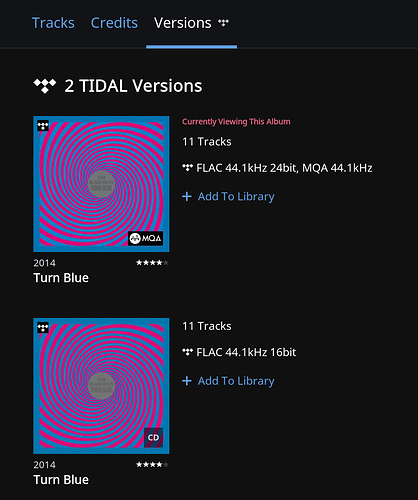Qobuz has 5 versions of The Lion King but what I did notice is track 14 Spirit by Beyoncé was not available on any of them. I guess that track is exclusive to Tidal?
I’m slightly disappointed in the sound quality of Tidal MQA. For instance, I have 3 different versions of Eurythmics, Sweet Dreams; a ripped CD on my Sonic Transporter, Tidal MQA, and 96/24 Flac from HD Tracks. By a significant margin the CD sounds better than the other 2 formats. On other albums the same holds true. Theoretically the higher resolution music file should sound best but it depends what the source material is. To my uneducated ears the sound engineers of the past have often done a better job with sound quality than what engineers do today when they dig up older material and remaster it. I see why Sonos sticks to CD quality. I was hoping I would exceed CD quality with Roon, Tidal, and my Bluesound Pulse 2i’s but so far this has been elusive.
Seems like a normal expectation with capitalism that experiences regulatory capture and an unfettered corporate control of nearly every industry.
Chris, which Black Keys album? Looks like both are there, under “Versions”
But yes, the “Let’s Rock” album from 2019 appears to be MQA only on TIDAL.
NM; I’m caught up on the thread.
Honestly, for me, mastering quality is so much more important than delivery format that I struggle to care much anymore. What I don’t like about “MQA Only” albums is that it feels like the label is trying too hard to protect the “essence” created in the studio–that truly uncompressed master. They don’t want the original fully uncompressed master to escape the studio, and MQA provides them with a way to satisfy consumers who want “high-rez” without giving them the master.
But, as far as sound quality differences with MQA switched on/off, I’m underwhelmed. MQA or not, well mastered recordings sound great while poorly mastered recordings (and there are many offered as MQA streams) sound crappy.
I’ll add that in many (most?) cases, when people are hearing significant differences between the CD and MQA versions on TIDAL, it’s because the MQA release was encoded from a different master. We’re not told, and there’s no way to know for sure. It’s not worth getting worked up over either way.
My advice is to keep a keen ear out for good music and don’t worry much about the format or “high-rez” too much. Play track 7 (Stop Those Bells) for some of your audio-geek friends and then watch their faces when you tell them that it’s just a 16-bit, 44.1 kHz recording. 
I do think this thread is a storm in a teacup. There’s nothing here to suggest a wholesale abandonment of 16/44.1 releases.
Listening to Sara K. right now. I agree that provenance of a recording–something MQA promised to bring to the table–is more important than format.
Spot on. This is so true. In particular certain labels have superior recordings…an example is ECM
